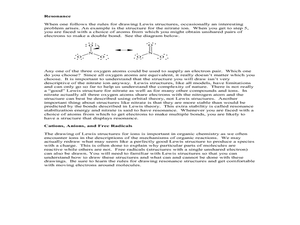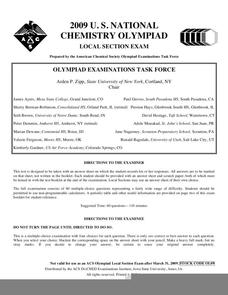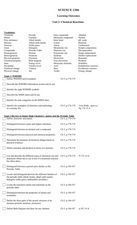Curated OER
1999 U.S. National Chemistry Olympiad Part III
In this chemistry olympiad laboratory worksheet, learners design and carry out two experiments. They design one experiment to test for the percent mass of a substance in a solution and they design another experiment to identify two...
Chemistry Teacher
Metals, Nonmetals, and Metalloids Lab
What an exciting way to introduce your blossoming chemists to the world of metals, nonmetals, metalloids, and polymers! Here is a lab activity that is designed to allow pupils the opportunity to visualize the reaction of metals,...
Curated OER
Drawing Lewis Structures
In this drawing Lewis structures worksheet, students read about the 5 steps taken to draw Lewis structures for atoms and molecules. These include identifying the valence electrons, placing pairs of electrons between atoms to be bonded,...
Curated OER
2004 U.S. National Chemistry Olympiad - Local Section Exam
In this National Olympiad exam worksheet, chemistry apprentices answer sixty multiple choice questions including general chemistry topics such as atomic structure, gases, problem solving, writing and balancing equations and solutions....
Curated OER
2000 U.S. National Chemistry Olympiad Local Section Exam
This 60-question comprehensive exam was designed to determine who would go on to compete in the 2000 US National Chemistry Olympiad. Hopefuls answer multiple choice questions regarding all chemistry topics taught in the first year...
Curated OER
2009 U. S. National Chemistry Olympiad - Local Section Exam
Here is a copy of a past national challenge exam that you can use in your general chemistry course as a unit or semester review. Sixty multiple-choice questions query learners on properties of matter, stoichiometry, reactions, and...
Curated OER
2007 U.S. National Chemistry Olympiad Local Section Exam
Sixty multiple choice questions cover the entire gamut of chemistry concepts. This is the local section of the U.S. National Chemistry Olympiad, where your chemistry candidates take a shot at entering the national competition. They...
It's About Time
Chemical Names and Formulas
Abracadabra! Provide your class with the tools to perform a chemical "magic show" as they predict the charges of various ions, determine ionic compound formulas, and make observations to determine when a chemical reaction between...
Curated OER
Observations of Properties of Matter
To guide learners through observations of chemical samples in the lab, this resource asks them to give all formulas and complete the attached data sheet. There are multiple questions about categories of elements and general...
Curated OER
WS 7.1.3 Molecular and Ionic Compounds
In this compounds activity, students name ionic and molecular compounds given their formulas. They also write the formulas for molecular and ionic compounds given their names.
Curated OER
5th grade science review
For this science review worksheet, 5th graders answer questions about molecules, force, elements, nature, and more. Students complete 25 multiple choice questions.
Curated OER
All About Circuits ~ Atomic Structure
In this interactive Internet assignment, physical science investigators answer 11 questions about the atom, the subatomic particles, and atomic structure. They can click on "Reveal Answer" to discover if they are correct. They also...
Beyond Benign
Catalysts and Oxygen
Here is an engaging and hands-on lesson plan that allows high school chemists to demonstrate the effects of a catalyst on various chemicals. They garner knowledge of how reactants and products differ from one another, while...
Beyond Benign
Green"er" Precipitation Reaction
All sodium carbonate may not have the same amount of carbonate, but it should have the same percent. Learners write and balance an equation to predict the chemical reaction between sodium carbonate and zinc acetate. Through the lab...
Curated OER
2005 U.S. National Chemistry Olympiad - Local Section Exam
National Chemistry Olympiad tests are released after their use each year, since they cannot use them again for this event. The result: outstanding comprehensive assessment resources for general chemistry classes! This 2005 version covers...
Curated OER
Ranking Molecular Properties Based Upon Intermolecular Forces
A splendid chart of information about chemical bonding tops the first page. In it you will find information on London forces, permanent dipoles, hydrogen bonds, ionic bonds, and covalent bonds. A four-step process for assigning...
Creative Chemistry
Maths for AS Chemistry
No practice problems are given on this handout; it is a detailed list of concepts to know and tips for working related problems in chemistry. Give this to learners as a study guide, or use it early in your career as a chemistry...
Curated OER
Learning Outcomes
In this science worksheet, students explore the learning outcomes for a unit on chemical reactions. Students define 60 vocabulary words and answer a list of questions for each topic.
Curated OER
Distinguishing Between Atoms
Every type of question is used to query young chemists about atomic structure. A vocabulary list tops the page before fill in the blanks, true/false, and matching questions are listed. This is a neatly formatted and pertinent worksheet...
Curated OER
Chapter Fourteen Questions: Human Genome
This multiple-choice and short-answer quiz covers chromosomes, genetic disorders, and more. The multiple choice section could work as a pretest, as well.
Curated OER
Acid/Base Equilibrium
In this equilibrium worksheet, students solve nine problems related to acids, bases, buffers, ionization and calculations of pH.
Curated OER
Minerals and Rock Cycle Review
In this minerals and rocks worksheet, learners answer questions about the chemistry of minerals, scratch tests, rocks and the rock cycle, and erosion and deposition.
Curated OER
Average Atomic Mass
In this average atomic mass activity, students read about how the protons and neutrons make up the atomic mass of an element. They find the average atomic mass given four problems.
Curated OER
Elements and Bonding Worksheet
In this elements and bonding worksheet, students classify given elements, they identify valence electrons in atoms, they explain the reactivity of elements, and they explain why certain atoms gain electrons while others lose electrons.























